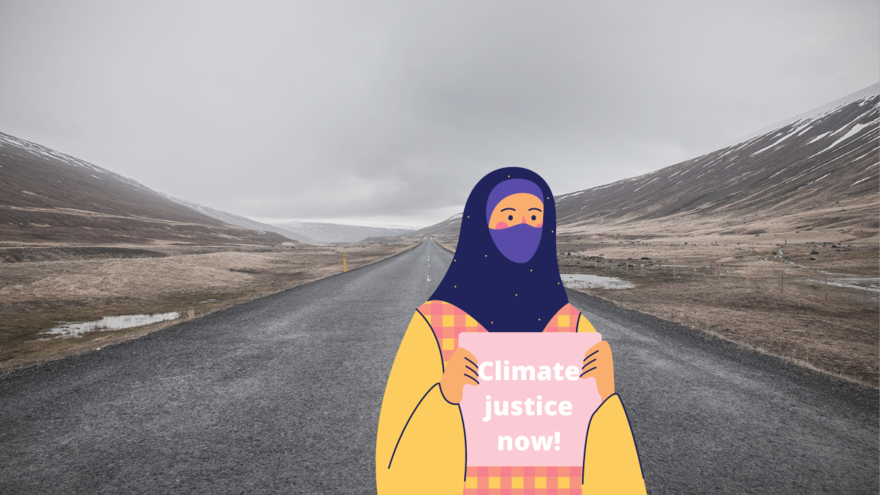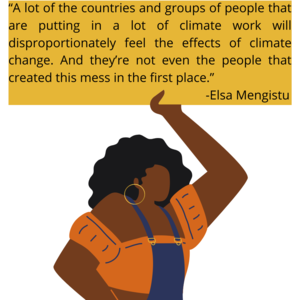
Our climate crisis disproportionately affects communities around the world.
One of the biggest threats to humanity and our way of life is the climate crisis. We are rapidly approaching the point where climate change impacts will be irreversible. Climate change encompasses the impacts and effects of global warming that includes the dramatic rise of sea levels, melting glaciers, and the populations affected by these changes in the climate over time.
Like environmental justice, climate justice supports and protects marginalized communities from harmful environmental impacts. However, climate justice brings the focus of these impacts to the world stage. Some communities that are affected more by climate change include communities of color, senior citizens, women, people with disabilities and/or pre-existing health concerns, low-income communities, Indigenous communities, and youth. Climate justice works to raise awareness to these discrepancies and help give these communities platforms to demand change.
Climate change disproportionately affects low-income communities around the world who are unable to protect themselves and rebuild after catastrophic climate-change-induced disasters. Areas prone to drought are drying up faster and for longer periods of time. Island nations are already suffering from rising sea levels and warming ocean waters.
An easy solution appears to be to move away from these problematic areas. However, that usually requires wealth, resources, strength, and luck to succeed. Climate change impacts have already caused an increase in climate refugees and migrants who must flee from their homes to survive. Even after leaving their homes, however, they face uncertainty in gaining citizenship and stability in other countries. Climate immigration and refugee issues will persist alongside our changing climate if we don’t take serious action to reduce our carbon emissions.
The majority of the greenhouse gas emissions that are causing our climate to rapidly change are not produced by individual actions. We can identify 100 companies globally that are responsible for 70% of all greenhouse gas emissions. Most of these companies extract and process fossil fuels. Statistics like this can make the fight for climate justice seem impossible and pointless. How impactful can individual actions be if large corporations are producing the majority of our emissions? A lot, it turns out.
One of the leaders for climate justice are Indigenous peoples. Their lands, cultures, and rights have been under constant attack since colonization. Indigenous activists around the world have continued to advocate for and protect their lands and ways of life. Samela Sateré-Mawé is a member of the Sateré-Mawé, an Indigenous tribe whose home is in the Amazon rainforest. Samela uses social media to advocate for the protection of the Amazon rainforest and environmental injustices worldwide. When not fighting for climate justice or studying biology, Samela makes face masks with other Indigenous women to protect their community from COVID-19.
Xuihtezcatl Martinez started fighting for the protection of land and people when he was a young teenager. Both a hip-hop artist and activist, Martinez uses popular culture to bring awareness to environmental issues in ways that reach people. He is also the youth director of the Earth Guardians, which trains and supports youth to lead in social and environmental justice movements.

Youth will bear the brunt of climate change effects. From schools being destroyed by natural disasters with unnatural frequencies to growing up in polluted communities, youth will suffer disproportionately from climate change. Youth are also one of the last to be listened to in climate conversations, even though their lives will be the most affected by climate change policies and inaction. Yet youth have persisted and have used their voices to create monumental change.
Zero Hour was started by student Jamie Margolin in 2017. She was frustrated by politicians' lack of action in regards to climate crises and the lack of representation of youth voices in these decisions. She was joined by Nadia Nazar, Madelaine Tew, and Zanagee Artis. They believe that #thisisZeroHour to act on climate change; we must start making drastic changes now. Zero Hour supports youth leadership in tackling climate injustice issues.
Climate scientists have agreed that we can only afford for our global climate to increase only 1.5 more degrees celsius before we reach a catastrophic climate crisis. From composting to zero waste to fighting for social justice, these movements are interconnected and important. We don’t have time to wait for someone else to fix these issues. We need to hold these large corporations accountable for their emissions. We need to act. Justice starts with each one of us choosing to be deliberate in our actions and attitudes.